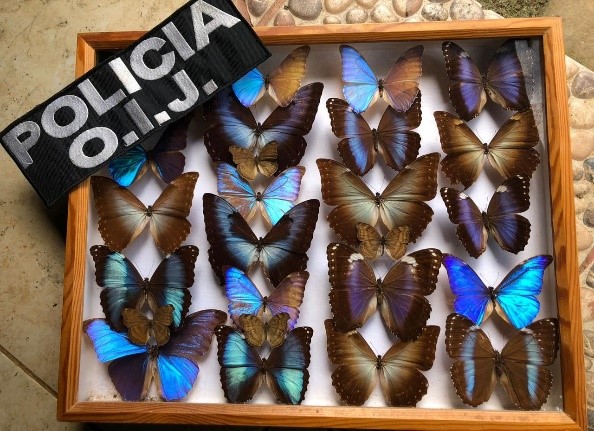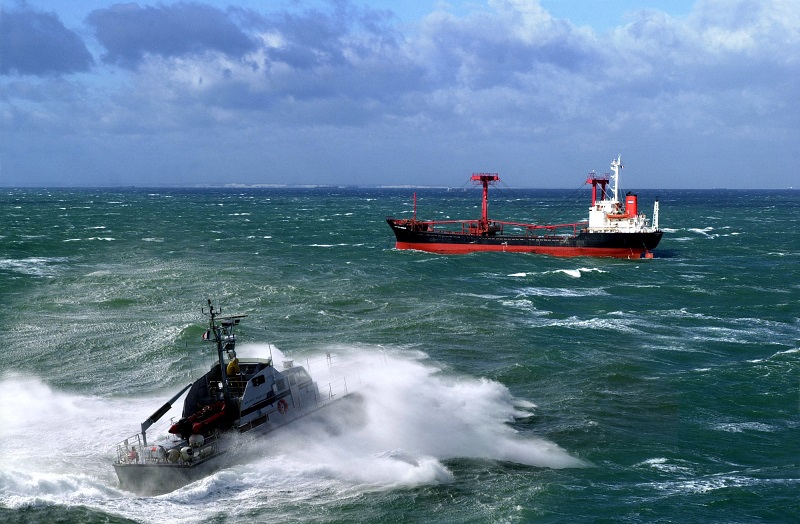EL PAcCTO committed to tackling environmental crime
Environmental crime is an extremely lucrative business, comparable to drug trafficking, arms trafficking and smuggling in several Latin American countries. In a joint report, Interpol and the United Nations Environment Programme (UNEP) estimate that environmental crimes amounted to between USD 91bn and USD 258bn in 2016, an increase compared to 2014. In addition, this type of crime does not only have an impact on natural resources: it is inextricably linked with organised crime offences, such as human trafficking, arms trafficking, corruption, money laundering and tax evasion.
For further reading: Xavier Cousquer, co-director of EL PAcCTO: The Pangolin, the desire for profit and the global health crisis
To address this constantly growing crime, since 2018, the EL PAcCTO programme has been supporting Latin American countries that are fighting against illicit trafficking in protected species and wildlife, illegal mining, deforestation and trafficking in precious woods, as well as the fires and the pollution caused in particular by the use of mercury and cyanide for gold mining. It is this problem which made it necessary to set up the Jaguar network.
Mobilisation at all levels
 The Jaguar network was set up in 2019 and allows the police forces of 13 European and Latin American countries* specialised in environmental crime to step up their operational cooperation. Europol and EMPACT EnviCrime are also part of it and Interpol is involved in it. Through a system of focal points in each member institution, this network makes it possible to exchange information (intelligence, modus operandi of criminal groups, investigation techniques…) between everyone in order to fight more effectively against environmental crime.
The Jaguar network was set up in 2019 and allows the police forces of 13 European and Latin American countries* specialised in environmental crime to step up their operational cooperation. Europol and EMPACT EnviCrime are also part of it and Interpol is involved in it. Through a system of focal points in each member institution, this network makes it possible to exchange information (intelligence, modus operandi of criminal groups, investigation techniques…) between everyone in order to fight more effectively against environmental crime.
This is because this type of crime almost always has a transnational dimension: better cooperation between the countries of origin, transit and destination is necessary to prevent and limit its impact. EL PAcCTO’s support initially focused on the Amazon basin and was subsequently extended to other countries in the continent. It strengthens coordination between institutions and cooperation between Latin American countries and the European Union: development of common standards, harmonisation of police and judicial procedures, dissemination of good practices, increase in exchanges between institutions of the penal chain (police, justice).
For further reading: Latin America: Strengthening the fight against environmental crimes
The Jaguar network mobilised against environmental crime
Since it was set up, the Jaguar network has directly or indirectly contributed to 11 international investigations. For example, in Brazil, it has supported the work of the Federal Police to fight against illicit timber trafficking between Latin America and the European Union. This has led to Operation Arquimedes, which has been coordinated at international level via Europol and Interpol, based on a triangular cooperation approach.
 The Jaguar network has also provided crucial support for an operation against wildlife trafficking between Costa Rica and European countries. In late 2019, the Costa Rican police dismantled a network which engaged in wildlife trafficking into the European Union, with the collaboration of several European countries in the context of the Jaguar network. Five searches took place on 20 November 2019 and led to the arrest of four people suspected of illegally exporting protected species of butterflies, beetles, spiders and wasps. The animals were already dead and were sent every month by post to be sold on the black market in France, Germany and the Netherlands. Other operations are currently underway, mainly related to the illegal mining of precious metals.
The Jaguar network has also provided crucial support for an operation against wildlife trafficking between Costa Rica and European countries. In late 2019, the Costa Rican police dismantled a network which engaged in wildlife trafficking into the European Union, with the collaboration of several European countries in the context of the Jaguar network. Five searches took place on 20 November 2019 and led to the arrest of four people suspected of illegally exporting protected species of butterflies, beetles, spiders and wasps. The animals were already dead and were sent every month by post to be sold on the black market in France, Germany and the Netherlands. Other operations are currently underway, mainly related to the illegal mining of precious metals.
The increase in demand, particularly in Europe, to buy protected species accounts for the exponential growth in the illegal trafficking of biodiversity in recent years. “We can no longer simply ask the countries of origin to carry out the investigations alone: it is necessary to broaden the responsibility for this trafficking to the countries of transit and, especially, the countries of destination”, explains Marc Reina, Thematic Manager of the Police Component of EL PAcCTO. “It is also essential to improve communication and the exchange of information between these three types of countries and increase coordination between police and judicial institutions: this is one of the objectives of EL PAcCTO”, he says.
* Bolivia, Brazil, Colombia, Costa Rica, Ecuador, Mexico and Peru for Latin America; France, Germany, Italy, Portugal and Spain for Europe.
 EL PAcCTO is a programme financed by the European Commission and implemented by Expertise France and FIIAPP, with support from IILA and Camões. It covers the entire penal chain and mainly aims to fight against transnational organised crime and strengthen the institutions responsible for ensuring the security of citizens in 18 Latin American countries.
EL PAcCTO is a programme financed by the European Commission and implemented by Expertise France and FIIAPP, with support from IILA and Camões. It covers the entire penal chain and mainly aims to fight against transnational organised crime and strengthen the institutions responsible for ensuring the security of citizens in 18 Latin American countries.
 More about EL PAcCTO: www.elpaccto.eu
More about EL PAcCTO: www.elpaccto.eu




